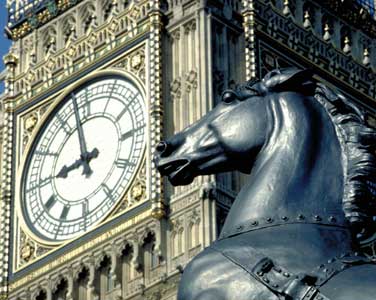 Forklifts in Britain are entering a pronounced downswing.
PHOTO: VISITBRITAIN |
By Bill Redmond
Alongside substantial capital injections to Linde UK, Britain's biggest forklift manufacturer, two more large forklift operators in Britain have needed rescue cash injections to shore up their weak balance sheets. They are Barloworld Handling Ltd and Jungheinrich UK Ltd, both subsidiaries of global companies.
The UK forklift environment has never been easy on most participants, typified by intense cut-throat competition and too much capacity. If it were not for the large degree of foreign ownership of UK-based forklift companies, many would not have survived, despite market consolidation through the disappearance of many UK brands over the last three decades.
Long since a mature industry and accurate bellweather of economic change, forklifts in Britain are entering a pronounced downswing. Already, UK sales of all types of powered forklifts in the first 10 months of 2008 are down by 3,973 trucks to 23,780 compared with the same period last year. All the indications are that it will be much worse next year with deteriorating pension scheme deficits straining balance sheets even more.
Barloworld Handling, reporting on its UK results in 2007, said that the year showed continued focus on the key business segments following the restructure that had taken place in the prior year. Yet its pre-tax loss on ordinary activities was GBP6.4 million (USD9.61million), (2006 loss was GBP4.5 million or USD6.76 million), although some GBP4.1 million (USD6.1 million) of that was increased funding for its deficit on the defined benefit pension scheme, where the net pension liability stood at GBP42.3 million (usd63.5 million). This brings the accumulated, pre-tax losses for 2004-2007 to around GBP15.7 million (USD23.5 million). No dividends were paid for 2006 and 2007. Turnover rose from GBP123 million (USD184 million) in 2006 to GBP133.8 million (USD201 million) last year while negative working capital climbed GBP1.5 million (USD2.25 million) to GBP13 million (USD19.5 million) and bank overdrafts soared from GBP15.8 million (USD 23.7million) to GBP22.7 million (USD34.1 million). Stocks also rose worryingly by around 50% to GBP13.2million (USD19.8 million).
To offset the deteriorating balance sheet, the company issued 837,000 GBP1(USD1.50) shares at GBP4 (USD6) a share to another Barlow company, giving a much welcome share premium boost, but a poor 2008 could leave that injection looking threadbare.
At Jungheinrich, where post-tax losses for 2007 deepened to GBP4 million (USD6 million), despite a 16% sales rise to GBP132.2 million (USD198.8 million), the need for a capital infusion was much more pressing. Like Barloworld Handling, Jungheinrich lost almost as much over 2004-2007, but in July this year it received a GBP49 million (USD73.6 million) injection to strengthen the balance sheet. It said that its net liabilities position resulted from years of trading losses and the recognition of the pensions scheme deficit. "Considerable efforts have been directed to successfully eliminating aged debt and reducing the level of stocks held," said the company. But it admits that "the devaluation of the pound against the Euro presents very real problems to businesses such as Jungheinrich who are dependent on high import volumes from the Eurozone. Nonetheless, with a high carry forward order book from 2007 and very strong enquiry levels in 2008, the directors are confident that the business is well placed to further improve its operational performance."
That comment, however, is months old and must now have a hollow ring. In an update on third quarter trading this year, Jungheinrich expects to achieve global sales of over EUR2.1 billion (USD2.83 billion) for 2008 but admits that world-wide demand for material handling equipment in the third quarter of 2008 fell by 4% compared with the same period last year owing to the global economic downturn. Sensibly, the company is slowing down its investment program but it would not be surprising if the UK operation needed another helping hand soon.
The pain in deteriorating UK markets was also felt by Cargotec's two UK subsidiaries, Hiab, the lorry loader specialist, and Moffett, which produces truck-mounted forklifts. These two companies will merge their UK sales operations in January 2009. "Tough market conditions and reduction in market demand has prompted us to act swiftly and improve the economics of our distribution and service network in the UK," said Ismo Leppanen, MD of Hiab.
Not all the major UK players, however, reported dismal 2007 results. Nacco Materials Handling Ltd, producer of the Hyster and Yale brands, showed UK sales rising 14.4% to GBP436.6 million (USD656.2 million) and pre-tax profits up GBP3.89 million (USD5.84 million) to GBP7.6 million (USD11.4 million).